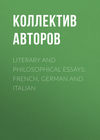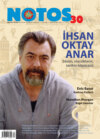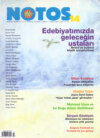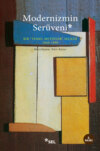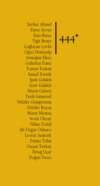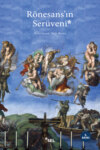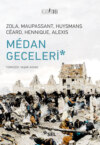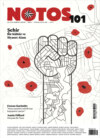Kitabı oku: «Literary and Philosophical Essays: French, German and Italian», sayfa 15
48
Add to all this the clothing and style.
1. The clothing of abstract truths, which were not entirely to be passed over, in allegories and instructive single circumstances, which were narrated as actual occurrences. Of this character are the Creation under the image of growing Day; the Origin of Evil in the story of the Forbidden Tree; the source of the variety of languages in the history of the Tower of Babel, &c.
49
2. The style – sometimes plain and simple, sometimes poetical, throughout full of tautologies, but of such a kind as practised sagacity, since they sometimes appear to be saying something else, and yet the same thing; sometimes the same thing over again, and yet to signify or to be capable of signifying at the bottom, something else: —
50
And then you have all the properties of excellence which belong to a Primer for a childlike people, as well as for children.
51
But every Primer is only for a certain age. To delay the child, that has outgrown it, longer in it than it was intended for, is hurtful. For to be able to do this is a way in any sort profitable, you must insert into it more than there is really in it, and extract from it more than it can contain. You must look for and make too much of allusions and hints; squeeze allegories too closely; interpret examples too circumstantially; press too much upon words. This gives the child a petty, crooked, hair splitting understanding: it makes him full of mysteries, superstitions; full of contempt for all that is comprehensible and easy.
52
The very way in which the Rabbins handled their sacred books! The very character which they thereby imparted to the character of their people!
53
A Better Instructor must come and tear the exhausted Primer from the child's hands. CHRIST came!
54
That portion of the human race which God had willed to comprehend in one Educational plan, was ripe for the Second step of Education. He had, however, only willed to comprehend on such a plan, one which by language, mode of action, government, and other natural and political relationships, was already united in itself.
55
That is, this portion of the human race was come so far in the exercise of its reason, as to need, and to be able to make use of nobler and worthier motives of moral action than temporal rewards and punishments, which had hitherto been its guides. The child had become a youth. Sweetmeats and toys have given place to the budding desire to go as free, as honored, and as happy as its elder brother.
56
For a long time, already, the best individuals of that portion of the human race (called above the elder brother); had been accustomed to let themselves be ruled by the shadow of such nobler motives. The Greek and Roman did everything to live on after this life, even if it were only in the remembrance of their fellow-citizens.
57
It was time that another true life to be expected after this should gain an influence over the youth's actions.
58
And so Christ was the first certain practical Teacher of the immortality of the soul.
59
The first certain Teacher. Certain, through the prophecies which were fulfilled in Him; certain, through the miracles which He achieved; certain, through His own revival after a death through which He had sealed His doctrine. Whether we can still prove this revival, these miracles, I put aside, as I leave on one side who the Person of Christ was. All that may have been at that time of great weight for the reception of His doctrine, but it is now no longer of the same importance for the recognition of the truth of His doctrine.
60
The first practical Teacher. For it is one thing to conjecture, to wish, and to believe the immortality of the soul, as a philosophic speculation: quite another thing to direct the inner and outer acts by it.
61
And this at least Christ was the first to teach. For although, already before Him, the belief had been introduced among many nations, that bad actions have yet to be punished in that life; yet they were only such actions as were injurious to civil society, and consequently, too, had already had their punishment in civil society. To enforce an inward purity of heart in reference to another life, was reserved for Him alone.
62
His disciples have faithfully propagated these doctrines: and if they had even had no other merit, than that of having effected a more general publication, among other nations, of a Truth which Christ had appeared to have destined only for the Jews, yet would they have even on that account alone, to be reckoned among the Benefactors and Fosterers of the Human Race.
63
If, however, they transplanted this one great Truth together with other doctrines, whose truth was less enlightening, whose usefulness was of a less exalted character, how could it be otherwise. Let us not blame them for this, but rather seriously examine whether these very commingled doctrines have not become a new impulse of directions for human reason.
64
At least, it is already clear that the New Testament Scriptures, in which these doctrines after some time were found preserved, have afforded, and still afford, the second better Primer for the race of man.
65
For seven hundred years past they have exercised human reason more than all other books, and enlightened it more, were it even only through the light which the human reason itself threw into them.
66
It would have been impossible for any other book to become so generally known among different nations: and indisputably, the fact that modes of thought so diverse from each other have been occupied on the same book, has helped on the human reason more than if every nation had had its own Primer specially for itself.
67
It was also highly necessary that each people for a period should hold this Book as the ne plus ultra of their knowledge. For the youth must consider his Primer as the first of all books, that the impatience to finish this book, may not hurry him on to things for which he has, as yet, laid no basis.
68
And one thing is also of the greatest importance even now. Thou abler spirit, who art fretting and restless over the last page of the Primer, beware! Beware of letting thy weaker fellow scholars mark what thou perceivest afar, or what thou art beginning to see!
Until these weaker fellow scholars are up with thee, rather return once more into this Primer, and examine whether that which thou takest only for duplicates of the method, for a blunder in the teaching, is not perhaps something more.
70
Thou hast seen in the childhood of the human race, respecting the doctrine of God's unity, that God makes immediate revelations of mere truths of reason, or has permitted and caused pure truths of reason to be taught, for some time, as truths of immediate revelation, in order to promulgate them the more rapidly, and ground them the more firmly.
71
Thou experiencest in the boyhood of the Race the same thing in reference to the doctrine of the immortality of the soul. It is preached in the better Primer as a Revelation, instead of taught as a result of human reason.
72
As we by this time can dispense with the Old Testament, in reference to the doctrine of the unity of God, and as we are by degrees beginning also to be less dependent on the New Testament, in reference to the immortality of the soul: might there not in this Book also be other truths of the same sort prefigured, mirrored, as it were, which we are to marvel at, as revelations, exactly so long as until the time shall come when reason shall have learned to educe them, out of its other demonstrated truths and bind them up with them?
73
For instance, the doctrine of the Trinity. How if this doctrine should at last, after endless errors, right and left, only bring men on the road to recognise that God cannot possibly be One in the sense in which finite things are one, that even His unity must be a transcendental unity, which does not exclude a sort of purality? Must not God at least have the most perfect conception of Himself, i. e., a conception in which is found everything which is in Him? But would everything be found in it which is in Him, if a mere conception, a mere possibility, were found even of his necessary Reality as well as of His other qualities? This possibility exhausts the being of His other qualities. Does it that of His necessary Reality? I think not. Consequently God can either have no perfect conception of himself at all, or this perfect conception is just as necessarily real, i. e., actually existent, as He Himself is. Certainly the image of myself in the mirror is nothing but an empty representation of me, because it only has that of me upon the surface of which beams of light fall. But now if this image had everything, everything without exception, which I have myself, would it then still be a mere empty representation, or not rather a true reduplication of myself? When I believe that I recognise in God a familiar reduplication, I perhaps do not so much err, as that my language is insufficient for my ideas: and so much at least for ever incontrovertible, that they who wish to make the idea thereof popular for comprehension, could scarcely have expressed themselves more intelligibly and suitably than by giving the name of a Son begotten from Eternity.
74
And the doctrine of Original Sin. How, if at last everything were to convince us that man standing on the first and lowest step of his humanity, is not so entirely master of his actions as to be able to obey moral laws?
75
And the doctrine of the Son's satisfaction. How, if at last, all compelled us to assume that God, in spite of that original incapacity of man, chose rather to give him moral laws, and forgive him all transgressions in consideration of His Son, i. e., in consideration of the self-existent total of all His own perfections, compared with which, and in which, all imperfections of the individual disappear, than not to give him those laws, and then to exclude him from all moral blessedness, which cannot be conceived of without moral laws.
Let it not be objected that speculations of this description upon the mysteries of religion are forbidden. The word mystery signified, in the first ages of Christianity, something quite different from what it means now: and the cultivation of revealed truths into truths of reason, is absolutely necessary, if the human race is to be assisted by them. When they were revealed they were certainly no truths of reason, but they were revealed in order to become such. They were like the "that makes" – of the ciphering master, which he says to the boys, beforehand, in order to direct them thereby in their reckoning. If the scholars were to be satisfied with the "that makes," they would never learn to calculate, and would frustrate the intention with which their good master gave them a guiding clue in their work.
77
And why should not we too, by the means of a religion whose historical truth, if you will, looks dubious, be conducted in a familiar way to closer and better conceptions of the Divine Being, our own nature, our relation to God, truths at which the human reason would never have arrived of itself?
78
It is not true that speculations upon these things have ever done harm or become injurious to the body politic. You must reproach, not the speculations, but the folly and the tyranny of checking them. You must lay the blame on those who would not permit men having their own speculations to exercise them.
79
On the contrary, speculations of this sort, whatever the result, are unquestionably the most fitting exercises of the human heart, generally, so long as the human heart, generally, is at best only capable of loving virtue for the sake of its eternal blessed consequences.
80
For in this selfishness of the human heart, to will to practice the understanding too, only on that which concerns our corporal needs, would be to blunt rather than to sharpen it. It absolutely will be exercised on spiritual objects, if it is to attain its perfect illumination, and bring out that purity of heart which makes us capable of loving virtue for its own sake alone.
81
Or, is the human species never to arrive at this highest step of illumination and purity? – Never?
82
Never? – Let me not think this blasphemy, All Merciful! Education has its goal, in the Race, no less than in the Individual. That which is educated is educated for something.
83
The flattering prospects which are open to the people, the Honor and
Well-being which are painted to him, what are they more than the means of educating him to become a man, who, when these prospects of
Honor and Well-being have vanished, shall be able to do his Duty?
84
This is the aim of human education, and should not the Divine education extend as far? Is that which is successful in the way of Art with the individual, not to be successful in the way of Nature with the whole? Blasphemy! Blasphemy!!
85
No! It will come! it will assuredly come! the time of the perfecting, when man, the more convinced his understanding feels itself of an ever better Future, will nevertheless not be necessitated to borrow motives of action from this Future; for he will do the Right because it is right, not because arbitrary rewards are annexed thereto, which formerly were intended simply to fix and strengthen his unsteady gaze in recognising the inner, better, rewards of well-doing.
86
It will assuredly come! the time of a new eternal Gospel, which is promised us in the Primer of the New Testament itself!
87
Perhaps even some enthusiasts of the thirteenth and fourteenth centuries had caught a glimpse of a beam of this new eternal Gospel, and only erred in that they predicted its outburst at so near to their own time.
88
Perhaps their "Three Ages of the World" were not so empty a speculation after all, and assuredly they had no contemptible views when they taught that the New Covenant must become as much antiquated as the old has been. There remained by them the similarity of the economy of the same God. Ever, to let them speak my words, ever the self-same plan of the Education of the Race.
89
Only they were premature. Only they believed that they could make their contemporaries, who had scarcely outgrown their childhood, without enlightenment, without preparation, men worthy of their Third Age.
90
And it was just this which made them enthusiasts. The enthusiast often casts true glances into the future, but for this future he cannot wait. He wishes this future accelerated, and accelerated through him. That for which nature takes thousands of years is to mature itself in the moment of his existence. For what possession has he in it if that which he recognises as the Best does not become the best in his lifetime? Does he come back? Does he expect to come back? Marvellous only that this enthusiastic expectation does not become more the fashion among enthusiasts. 91
Go thine inscrutable way, Eternal Providence! Only let me not despair in Thee, because of this inscrutableness. Let me not despair in Thee, even if Thy steps appear to me to be going back. It is not true that the shortest line is always straight.
92
Thou hast on Thine Eternal Way so much to carry on together, so much to do! So many aside steps to take! And what if it were as good as proved that the vast flow wheel which brings mankind nearer to this perfection is only put in motion by smaller, swifter wheels, each of which contributes its own individual unit thereto?
93
It is so! The very same Way by which the Race reaches its perfection, must every individual man – one sooner – another later – have travelled over. Have travelled over in one and the same life? Can he have been, in one and the self-same life, a sensual Jew and a spiritual Christian? Can he in the self-same life have overtaken both?
94
Surely not that! But why should not every individual man have existed more than once upon this World?
95
Is this hypothesis so laughable merely because it is the oldest?
Because the human understanding, before the sophistries of the Schools had dissipated and debilitated it, lighted upon it at once?
Why may not even I have already performed those steps of my perfecting which bring to man only temporal punishments and rewards?
97
And once more, why not another time all those steps, to perform which the views of Eternal Rewards so powerfully assist us?
Why should I not come back as often as I am capable of acquiring fresh knowledge, fresh expertness? Do I bring away so much from once, that there is nothing to repay the trouble of coming back?
99
Is this a reason against it? Or, because I forget that I have been here already? Happy is it for me that I do forget. The recollection of my former condition would permit me to make only a bad use of the present. And that which even I must forget now, is that necessarily forgotten for ever?
100
Or is it a reason against the hypothesis that so much time would have been lost to me? Lost? – And how much then should I miss? – Is not a whole Eternity mine?
LETTERS UPON THE AESTHETIC EDUCATION OF MAN
BY J. C. FRIEDRICH VON SCHILLER
INTRODUCTORY NOTE
An outline of the life of Schiller will be found prefixed to the translation of "Wilhelm Tell" in the volume of Continental Dramas in The Harvard Classics.
Schiller's importance in the intellectual history of Germany is by no means confined to his poetry and dramas. He did notable work in history and philosophy, and in the department of esthetics especially, he made significant contributions, modifying and developing in important respects the doctrines of Kant. In the letters on "Esthetic Education" which are here printed, he gives the philosophic basis for his doctrine of art, and indicates clearly and persuasively his view of the place of beauty in human life.
LETTERS UPON THE AESTHETIC EDUCATION OF MAN
LETTER I
By your permission I lay before you, in a series of letters, the results of my researches upon beauty and art. I am keenly sensible of the importance as well as of the charm and dignity of this undertaking. I shall treat a subject which is closely connected with the better portion of our happiness and not far removed from the moral nobility of human nature. I shall plead this cause of the Beautiful before a heart by which her whole power is felt and exercised, and which will take upon itself the most difficult part of my task in an investigation where one is compelled to appeal as frequently to feelings as to principles.
That which I would beg of you as a favour, you generously impose upon me as a duty; and, when I solely consult my inclination, you impute to me a service. The liberty of action you prescribe is rather a necessity for me than a constraint little exercised in formal rules, I shall scarcely incur the risk of sinning against good taste by any undue use of them; my ideas, drawn rather from within than from reading or from an intimate experience with the world, will not disown their origin; they would rather incur any reproach than that of a sectarian bias, and would prefer to succumb by their innate feebleness than sustain themselves by borrowed authority and foreign support.
In truth, I will not keep back from you that the assertions which follow rest chiefly upon Kantian principles; but if in the course of these researches you should be reminded of any special school of philosophy, ascribe it to my incapacity, not to those principles. No; your liberty of mind shall be sacred to me; and the facts upon which I build will be furnished by your own sentiments; your own unfettered thought will dictate the laws according to which we to proceed.
With regard to the ideas which predominate in the practical part of Kant's system, philosophers only disagree, whilst mankind, I am confident of proving, have never done so. If stripped of their technical shape, they will appear as the verdict of reason pronounced from time immemorial by common consent, and as facts of the moral instinct which nature, in her wisdom, has given to man in order to serve as guide and teacher until his enlightened intelligence gives him maturity. But this very technical shape which renders truth visible to the understanding conceals it from the feelings; for, unhappily, understanding begins by destroying the object of the inner sense before it can appropriate the object. Like the chemist, the philosopher finds synthesis only by analysis, or the spontaneous work of nature only through the torture of art. Thus, in order to detain the fleeting apparition, he must enchain it in the fetters of rule, dissect its fair proportions into abstract notions, and preserve its living spirit in a fleshless skeleton of words. Is it surprising that natural feeling should not recognise itself in such a copy, and if in the report of the analyst the truth appears as paradox?
Permit me therefore to crave your indulgence if the following researches should remove their object from the sphere of sense while endeavouring to draw it towards the understanding. That which I before said of moral experience can be applied with greater truth to the manifestation of "the beautiful." It is the mystery which enchants, and its being is extinguished with the extinction of the necessary combination of its elements.
